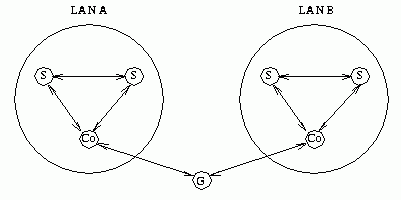Time Servers
A time server is a node that is designated to answer queries about the time. The number of time servers in a DCE cell is configurable; three per LAN is a typical number. Time clerks query these time servers for the time, and the time servers query one another, computing the new system time and adjusting their own clocks as appropriate. One or more of the time servers can be attached to an external time provider (described later in this section).
A distinction is made between local time servers (time servers on a given LAN) and global time servers. This is because they are located differently by their clients. A client may need to contact a global time server if, for example, the client wants to get time from three servers, but only two servers are available on the LAN. In addition, it may be desirable to configure a DTS system to have two LAN servers and one global time server synchronizing with each other, rather than just having time servers within the LAN synchronizing with each other. This is where couriers are needed.
A courier time server is a time server that synchronizes with a global time server; that is, a time server outside the courier's LAN. It thus imports an outside time to the LAN by synchronizing with the outside time server. Other time servers in the LAN can be designated as backup courier time servers. If the courier is not available, then one of the backup couriers serves in its place.
The following figure shows two LANs (LAN A and LAN B) and their time servers (S). In each LAN, one of the time servers acts as a courier time server (Co) by querying a global time server (G) (that is, a time server outside of either LAN) for the current time.
Local, Courier, and Global Time Servers
